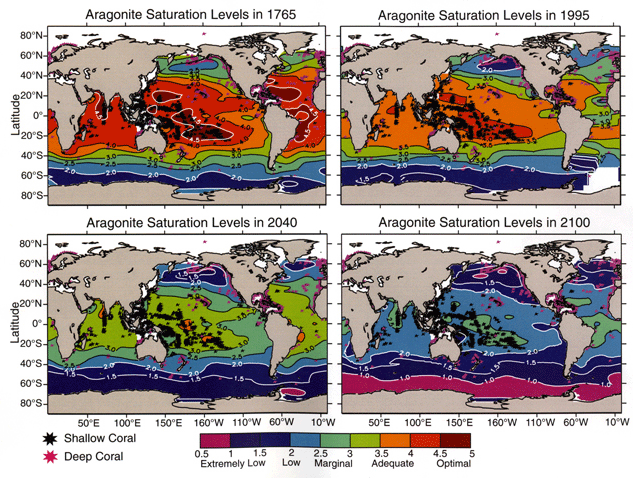
The Pacific Ocean from Canada to Mexico within 20 miles of shore is showing sharp changes in pH levels for the first time. Scientists have feared this possibility as yet another side effect of our growing carbon dioxide emissions. Excessive CO2 in the air is absorbed by the ocean, forming carbonic acid that corrodes the shells of many marine creatures, including those that form the backbone of marine foodwebs. Worse, the acidified water upwelled from the deeper ocean is likely 50 years old. This suggests that acidification will increase in a delayed response to atmospheric CO2, which has grown from 310 parts per million 50 years ago to 380 parts per million today—the highest on Earth in more than a million years. “The coastal ocean acidification train has left the station,” says Burke Hales of Oregon State University and an author of the Science study, “and there’s not much we can do to derail it.”
There is also a strong correlation between acidification and the dead zones forming off the Oregon and California coasts in recent summers. The dead zones are caused by upwelling waters that fuel an over-abundance of the tiny marine plants known as phytoplankton. Normally, the upwelling winds subside for a day or two every couple of weeks in a ‘relaxation event’ that allows the buildup of decomposing organic matter to be washed out to the deep ocean. But in recent years, especially in 2002 and 2006, there were few if any relaxation breaks and the phytoplankton blooms were enormous. “When the material produced by these blooms decomposes,” Hales says, “it puts more CO2 into the system and increases the acidification.”
It’s too early to predict the biological ramifications. Shell-building plants and animals may be adapting, or they may already be suffering consequences that scientists have not yet determined. “We may have to assume that CO2 levels will gradually increase through the next half century as the water that originally was exposed to increasing levels of atmospheric carbon dioxide is cycled through the system. Whether those elevated levels of carbon dioxide tip the scale for aragonites [shell-builders] remains to be seen,” says Hale.
Julia Whitty is Mother Jones’ environmental correspondent, lecturer, and 2008 winner of the Kiriyama Prize and the John Burroughs Medal Award.











